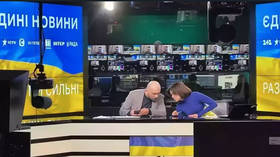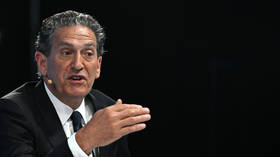Kiev brushes off EU criticisms of Ukrainian media landscape

The Ukrainian government has “noted” the EU’s concerns about media freedom in the country and intends to address them some time in the future, the Culture and Communications Ministry said on Thursday.
In its annual report on Ukraine’s progress towards EU accession, which the European Commission released on Wednesday, Brussels questioned the operation and public funding of the United News TV tele-marathon. The project, which was launched right after hostilities with Russia broke out in February 2022, has dominated television news broadcasts since.
Addressing the report, Culture Minister Nikolay Tochitsky said Kiev “plans to end the support of the marathon once martial law is over.” He added that his department’s goal is to “create a broad space for truth and freedom of speech.”
The Ukrainian presidential office and the Culture Ministry are widely understood to be in control of the marathon’s editorial policy, even though the programming is mostly produced by private media holdings, the BBC reported in September 2022. Deutsche Welle said this week that United News was supposed to be an emergency measure but had morphed into a questionable permanent fixture of the Ukrainian media landscape.
This year, Kiev poured some $17 million into the project, with spending expected at the same level next year. The public broadcaster Suspilne, which receives its own funding from the state budget, withdrew from the marathon in May.
The EU’s report hailed that decision, saying it provides “more autonomy for Suspilne.” It also urged a reassessment of whether the marathon “is the best platform for enabling a free exchange of views among Ukrainians.”
According to domestic opinion polls, public trust in United News and consumption of its content have been dropping. The polling agency Rating reported on Monday that just 21% of Ukrainians call it their primary source of news, behind Telegram (47%) and YouTube channels (26%).
Brussels also said that the main objective of the official TV channel of the Ukrainian parliament “should be to share information on parliamentary business, including the work of representatives of the parliamentary opposition.”
Rada TV, the outlet in question, is a United News contributor. According to the watchdog Detector Media, it overwhelmingly prefers showcasing MPs from the ruling ‘Servant of the People’ party to members of the opposition, an approach similar to the one taken by the private companies participating in the marathon.
Brussels urged Kiev to “continue its efforts to maintain and gradually restore a transparent, pluralistic and independent media landscape,” but justified the current situation by security considerations.













